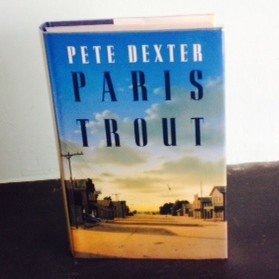Inspiring Older Readers
 posted on 01 Jun 2024
posted on 01 Jun 2024
Paris Trout by Pete Dexter
Published in 1988, Pete Dexter's Paris Trout is most frequently described as a study of 1950s Deep South bigotry but for todays readers it has an extraordinary resonance. The story of Paris Trout, a big fish in a small-time hicksville town called Cotton Point in Georgia, is indeed a flesh-crawling study of small town racism but it's also a fable of what happens when bigots are allowed to flourish unchallenged. Dexter also draws an astonishingly prescient portrait of what happens when you create an uncontrolled gun culture amongst people who prefer to shoot things than use reason to solve their problems.
Trout, a money lender to the poor population of the town, guns down a black woman and a black child while trying to make good on a defaulted loan and finds himself at the mercy of the law for the first time in his life. He is blind to everything except his own truth - that he and all white people have a God given right to do anything they want and that guns and violence are a legitimate way of enforcing this superiority. Unsurprisingly, Trout is also a misogynist and mistreats and abuses his wife with impunity and as his life spirals out of control his humiliation of Hanna becomes more and more unsavoury. The only person Trout seems to have any emotional connection with is his elderly mother who is living in a home, ironically being cared for and totally dependent on a black woman. This suggests that he is, in fact, more of a psychopath than a bigot and his desire to control, everything and everyone he meets supports this interpretation.
The book positively crackles with supressed and unhealthy sexuality; it's not just Trout who has unresolved sexual issues but his wife, the lawyers in the town and their wives. As disgusting as Trout is, just about everyone except the murdered child are also riven with ambiguities and fatal flaws - no-one is beyond reproach and this helps to elevate still further the truly repulsive nature of the central character. Avarice and money-making also help to twist and poison the lives of everyone - judges take bribes or curry favour for electoral advantage, lawyers are prepared to suspend their moral judgements for financial gain and Trout himself is so obsessed with his wealth that Dexter seems to be inviting you to compare him with Ben Jonson's Volpone.
You get the distinct impression that if you had to spend any time in Cotton Point, you'd die of suffocation - and, indeed, incomers to the town like Leslie Bonner, feel exactly that sense of oppression. Inevitably, the story ends in carnage - but I wont spoil the plot by telling you how. Dexter's ability to write a compelling tale of how a psychopathic personality can poison a whole community is undoubted first rate because this is a fine read and excellently written by a prose stylist. But, for me, his real success here is to show how by neglect the wider community allows the Paris Trouts of this world to exist and even to flourish - it makes them rich, powerful and untouchable. Now if that's not an important message for today, I don't know what is.
The copy I read was published by Collins in 1988 but affordable paperback copies are easily found.
Terry Potter
June 2024